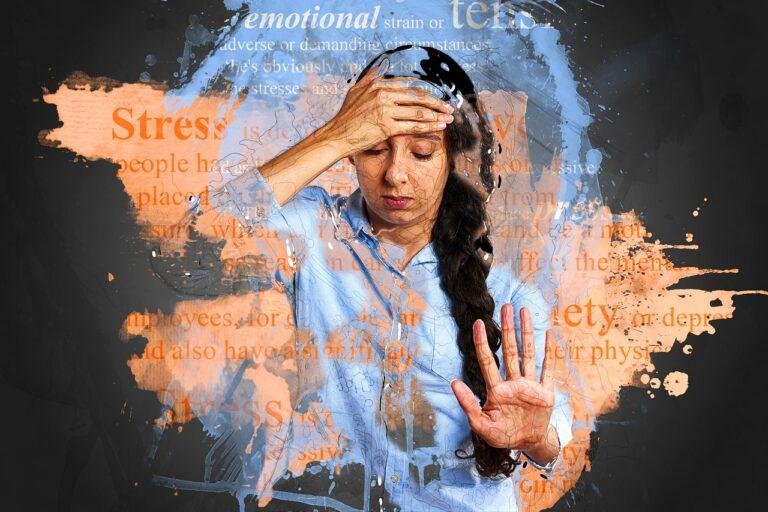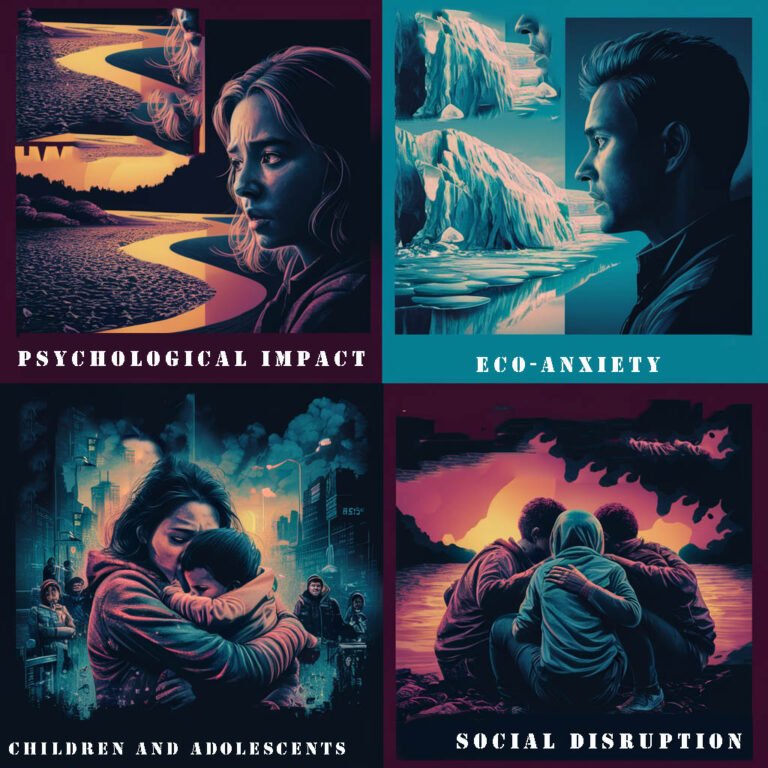Introduction
Extreme weather events linked to climate change, such as hurricanes, floods, and wildfires, have devastating effects on individuals and communities. These events not only cause physical harm but also leave psychological scars. Survivors often experience symptoms of post-traumatic stress disorder (PTSD), anxiety, and depression due to the trauma they endured. Witnessing the destruction of homes, loss of loved ones, and displacement can have long-lasting psychological consequences.


Impacts of Climate Change on Mental and Psychological Health
1. Post-Traumatic Stress Disorder (PTSD)
Natural disasters like hurricanes and floods can lead to PTSD, characterized by flashbacks, severe anxiety, and uncontrollable thoughts about the event. According to the National Center for PTSD, up to 30% of disaster survivors may experience PTSD. The prevalence of PTSD doubled after Hurricane Katrina, affecting about 30% of the population in the hardest-hit areas
2. Anxiety and Depression
The uncertainty and fear of future climate-related events can cause chronic anxiety and depression, affecting daily functioning and quality of life.
A 2018 APA survey found that 68% of Americans are somewhat or extremely worried about climate change. The WHO estimates that depression will be the leading cause of disease burden globally by 2030, with climate change as a contributing factor
3. Eco-Anxiety
A persistent worry about environmental degradation and climate change impacts, leading to feelings of helplessness and existential dread. For instance, people might worry about the future of their children, the loss of natural habitats, or the increasing frequency of natural disasters. Symptoms can include insomnia, difficulty concentrating, and a persistent sense of unease.
The APA defines eco-anxiety as a chronic fear of environmental doom. A 2020 survey by the Yale Program on Climate Change Communication found that 66% of Americans report being at least “somewhat worried” about climate change, with 31% saying they are “very worried”
4. Cognitive Impairment
Chronic stress from climate-related events can impair cognitive functions, such as memory and concentration, negatively impacting productivity and decision-making.
5. Increased Suicide Rate
Studies have shown a rise in suicide rates following extreme weather events, as individuals struggle to cope with the aftermath and loss. For example, a study published in the Proceedings of the National Academy of Sciences found that exposure to extreme heat increases the risk of mental health problems, including suicide.
6. Loss of Identity and Cultural Heritage
The destruction of natural landscapes and communities can lead to a profound sense of loss and grief, impacting cultural identity and mental health
Scientific Evidences
Studies have shown a clear association between climate change-related events and mental health consequences. For example, a study published in the Proceedings of the National Academy of Sciences found that exposure to extreme heat increases the risk of mental health problems, including suicide. Another study conducted after Hurricane Katrina in 2005 revealed a significant rise in mental health disorders among affected individuals.
- According to the American Psychological Association (APA), climate change-related events such as natural disasters can lead to significant mental health issues, including post-traumatic stress disorder (PTSD), depression, and anxiety. After Hurricane Katrina, for instance, the prevalence of serious mental illness doubled from 6.1% to 11.3% among affected individuals.
- A study published in the Journal of the American Medical Association (JAMA) Psychiatry found that people exposed to extreme weather events, such as hurricanes and floods, have a 50% increased risk of developing anxiety and mood disorders
A real Life Evidence
Personal stories also shed light on the mental health impact of climate change. Many people living in areas prone to climate-related disasters have shared their experiences of anxiety and depression caused by the constant threat of such events. These stories emphasize the real-life consequences of climate change on mental well-being.
Jane, a 34-year-old mother of two from California, used to find solace in the rhythm of the seasons. However, after experiencing the devastation of wildfires three years in a row, her mental health began to unravel. The constant threat of evacuation and the thick, suffocating smoke became a source of chronic anxiety.
Sleep eluded her as she lay awake, fearing for her children’s future in an increasingly volatile environment. Therapy sessions revealed her deep-seated eco-anxiety, a condition exacerbated by witnessing her community’s repeated trauma. Jane’s story is a poignant reminder of how climate change extends beyond physical destruction, seeping into the mental well-being of those caught in its path


Vulnerable Populations
Certain groups, such as low-income communities, indigenous peoples, and children, are particularly vulnerable to the mental health impacts of climate change. Low-income communities often lack the resources and infrastructure to cope with climate-related disasters, leading to increased stress and trauma. Children, who are more susceptible to environmental stressors, face long-term emotional and psychological consequences. Moreover, these vulnerable groups often face disparities in accessing mental health resources, including limited availability, cultural barriers, and financial constraints.


Climate Activism & Mental Well Being
Engaging in climate activism can have a positive impact on mental health by fostering a sense of purpose, community, and empowerment. Taking action to address climate change provides individuals with a meaningful cause to fight for, instilling a sense of purpose and motivation. Climate activists often find a supportive community of like-minded individuals, which helps combat feelings of isolation and despair.
Coping Strategies & Resilience-Building Techniques
Some key coping strategies and resilience-building techniques that can help individuals and communities navigate the mental health challenges posed by climate change.
1. Self-Care
-
- Practice self-care activities such as mindfulness, meditation, and deep breathing exercises to reduce stress and promote emotional well-being.
- Engage in activities that bring joy and relaxation, such as hobbies, spending time in nature, or listening to music.
2. Social Support
-
- Seek out social connections and support from friends, family, or support groups to share concerns and feelings related to climate change.
- Engage in community-based initiatives or join climate action groups to find a sense of belonging and work collectively towards solutions.
3. At-Home Coping Strategies
- Create a calm and soothing environment at home by incorporating elements of nature, such as plants or natural light.
- Limit exposure to distressing climate-related news or images to prevent overwhelm.
- Engage in creative outlets, such as writing, painting, or gardening, to express emotions and find solace.
- Establish routines and structure to provide a sense of stability and control.
Conclusion
The intersection of climate change and mental health reveals a profound and multifaceted crisis that extends beyond physical environmental damage. From PTSD and anxiety to eco-anxiety and substance abuse, the psychological impacts are significant and widespread. As climate events become more frequent and severe, the toll on mental health is expected to rise, underscoring the urgent need for comprehensive strategies that address both environmental sustainability and psychological resilience. Proactive measures, community support, and mental health resources are essential to mitigate these effects and support individuals and communities in navigating the challenges ahead




